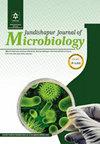Frequency of Clostridioides difficile Infection Among Hospitalized Patients in Kerman City, Iran
IF 0.5
4区 医学
Q4 MICROBIOLOGY
引用次数: 0
Abstract
Background: Clostridioides difficile is one of the major causes of nosocomial infections, being responsible for 15 to 25% of antibiotic-associated diarrhea. It is important to determine the epidemiology and prevalence of this bacterium at hospitals and healthcare centers. Objectives: This study aims to investigate the prevalence of C. difficile infection (CDI) by identifying toxigenic isolates of C. difficile in different wards of the hospital. Methods: A total of 417 diarrheal stool samples were taken from hospitalized patients in different wards of three educational hospitals in Kerman City, Iran from 2018 to 2020. The samples were cultured on cycloserine-cefoxitin fructose agar and C. difficile suspected colonies were isolated. Identification of the cdd-3 gene for definitive diagnosis of C. difficile and identification of toxin genes in the positive isolates was performed using the PCR method. Results: A total of 68 isolates (16.3%) of C. difficile were isolated from the specimens. Besides, 8.6% (36/417) and 7.6% (32/417) of the isolates were toxigenic and nontoxigenic, respectively; thus, the prevalence of CDI was 8.6%. Most of the toxigenic isolates had the A+B+CDT- toxin phenotype. The highest prevalence of CDI was observed in males, ICU ward, and age group of 41 - 60. Conclusions: A total of 8.6% of hospitalized patients with diarrhea were infected with C. difficile. The prevalence of CDI in Kerman City is lower than that in Europe, East Asia, and other parts of Iran, but it is almost the same as that in the Middle East.伊朗克尔曼市住院患者中艰难梭菌感染频率分析
背景:艰难梭菌是院内感染的主要原因之一,占抗生素相关性腹泻的15%至25%。确定这种细菌在医院和保健中心的流行病学和流行程度是很重要的。目的:本研究旨在通过鉴定难辨梭菌在医院不同病房的产毒分离株,了解难辨梭菌感染(CDI)的流行情况。方法:采集伊朗克尔曼市3所教育医院2018 - 2020年不同病房住院患者的腹泻粪便样本417份。在环丝氨酸-头孢西丁-果糖琼脂培养基上培养,分离出疑似难辨梭菌菌落。采用PCR方法对艰难梭菌的cdd-3基因进行鉴定,并对阳性分离株的毒素基因进行鉴定。结果:从标本中分离出难辨梭菌68株(16.3%)。产毒株占8.6%(36/417),非产毒株占7.6% (32/417);因此,CDI患病率为8.6%。大多数产毒株具有A+B+CDT-毒素表型。CDI患病率最高的是男性、ICU病房和41 - 60岁年龄组。结论:住院腹泻患者中难辨梭菌感染率为8.6%。克尔曼市的CDI患病率低于欧洲、东亚和伊朗其他地区,但与中东地区几乎相同。
本文章由计算机程序翻译,如有差异,请以英文原文为准。
求助全文
约1分钟内获得全文
求助全文
来源期刊

Jundishapur Journal of Microbiology
MICROBIOLOGY-
CiteScore
1.30
自引率
0.00%
发文量
56
审稿时长
6-12 weeks
期刊介绍:
Jundishapur Journal of Microbiology, (JJM) is the official scientific Monthly publication of Ahvaz Jundishapur University of Medical Sciences. JJM is dedicated to the publication of manuscripts on topics concerning all aspects of microbiology. The topics include medical, veterinary and environmental microbiology, molecular investigations and infectious diseases. Aspects of immunology and epidemiology of infectious diseases are also considered.
 求助内容:
求助内容: 应助结果提醒方式:
应助结果提醒方式:


